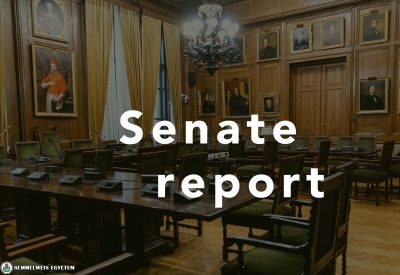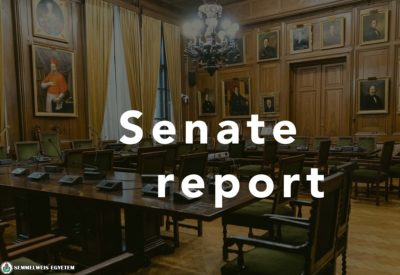The Senate heard a report on the rector’s activities over the previous year at its meeting on November 25. Dr. Béla Merkely emphasized in the information prepared for the body that Semmelweis University has performed outstandingly in the fields of education, research and patient care in the past extraordinary period, and thus, as the rector said, “we have come closer to achieving our strategic goals.” The efforts made to become one of the top 100 universities in the world and one of the top 5 medical universities in Europe have already yielded results in the short term: in the latest Times Higher Education ranking, Semmelweis University was ranked 277th, moving up 149 places.
In his report, the rector pointed out that the COVID-19 pandemic has also had a significant impact on the delivery of services in the past year. Semmelweis University continues to play a leading role in the response, and this requires the personal commitment of the institution and its staff on a daily basis. At the same time, the university’s outstanding performance in the pandemic has enhanced its social standing, its national and international recognition has continued to grow and its regional leadership has been consolidated.
The more than 110-page document prepared for the Senate also refers to the successful preparation and implementation of the model change, and to the signing of the long-term framework agreement and the public service financing contract for the next six years. The rector spoke about the importance of human resources, measures to retain staff and increase their recognition, such as differentiated pay based on performance reviews and the Family-Friendly University Program. The rector also spoke about infrastructure and organizational improvements, the renewal of fundraising activity, the development of health care activities and the launch of new courses and degree programs.
Over the past year, the university’s Institutional Development Plan for 2021-24 has been renewed in line with the rector’s program. Significant progress has been made in the areas of research, development and innovation, and the number of students and PhD students has increased.
The Senate, chaired by the rector, adopted 145 decisions covering the whole spectrum of the university’s operations and development.
Following the Senate’s decision, a traumatology service will be established at the Department of Orthopedics – a new specialty at Semmelweis University, expected to be launched in the first semester of 2022. In connection with this, the university has signed a Memorandum of Understanding with the Péterfy Hospital and Clinic Institute and the Jenő Manninger National Institute of Traumatology to take over the progressive level I traumatology care in the 8th district of Budapest. In parallel, the clinic’s new name will be changed to Department of Orthopedics and Traumatology. This Memorandum of Understanding also covers the transfer of active progressive level I internal medicine care for the residents of district 8 to the two internal medicine clinics of the university.
According to the Senate’s decision, “Fundamentals of Bridge” will be offered as a two-credit elective course in English from the second semester of the academic year 2021/22. This is linked to the sports department system established at the university this year, in which bridge has been included as a competitive sport.
The body approved the rules of procedure of the standing committees of the Faculty of Dentistry.
The establishment of a Master’s program in data-driven health care at the Faculty of Health and Public Administration’s (EKK) Health Services Management Training Center, as well as its training and outcome requirements, was approved. The current digital transformation in the health sector and the emergence of data-driven decision-making models necessitated the launch of this niche training program.
The body voted in favor of a technical amendment to the curriculum of the Institute of Mental Health of the EKK, which provides for a specialized training course in marriage and family counseling. It was decided to introduce an elective course in English, Sustainability in Healthcare, which will be offered as an integrated course from the spring semester.
Approval was given to the amendment of the Rules of Organization and Functioning of the András Pető Faculty. The modification was justified by the inclusion of a new department, created in August under the direct leadership of the dean, and changes related to the model change.
Following the elections of the Doctoral Students’ Council (DÖK), new doctoral members of the university-wide standing committees were elected.
The Selye János Doctoral College, which aims to be a niche professional workshop at the university, can be established.
Pálma Dobozi
Translation: Tamás Deme


